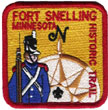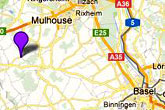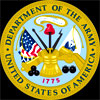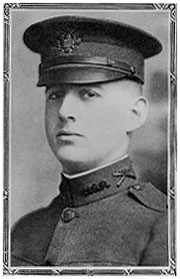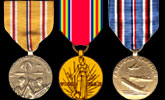| North
High School Wall of Honor Matthew Dale Eckerman Class of 1914 Killed in Action; November 10, 1918 |
 |
|||||||||||||||||||||||
| Research done by Rick Nehrling, class of 1963 and Claradell Shedd, class of 1953.. | ||||||||||||||||||||||||
|
||||||||||||||||||||||||
| Text
regarding the 351st Infantry Regiment, 88th Divison in Alsace: The daily grind of drill, of instruction, of target practice, of the many seemingly trifling things that go to instill discipline and training were cheerfully carried out. Our time was short. France was calling for assistance and our orders were to train the men quickly, to get them in shape in the shortest possible time. We worked with them for three months, then came orders from Washington to send these thousands of men elsewhere. The calls were so urgent, our men had acquired their training so quickly, that it was evident the inspectors had recommended that they be transferred to France, so a thousand of the men were sent here, two thousand there. To one division at Atlanta we sent over four thousand men whom we had trained. Our division and this regiment were reduced very, very materially, but immediately the vacancies were filled up with a similar lot of men. The next contingent came from this state, the Dakotas, Minnesota, Nebraska, and a few from Illinois. Then the grind commenced again. The younger officers who did not have much experience at first were better fitted by this time, and the second contingent were put through the training period more effectively. The division during the first seven months lost over forty-eight thousand men by transferring them to outgoing divisions, and I happen to have the records of the battle losses of five of these divisions. They were forty thousand five hundred and eight men. We were again filled up, but our officers were becoming discouraged, due to the fear that we might never get across. In July, 1918, however, orders came for the division to go to France. I do not know the percentage of men in this particular regiment who had over three months' training, but the division as a whole had eight thousand men of over three months' training, thirteen thousand between one and three months, and six thousand with less than one month's training. Conscious of its power and its ability to render the highest service, the regiment went across, landing in France in the early days of September and continuing its training there where it was in touch with actual war conditions. We lacked considerable equipment, but it was later supplied, and in less than a month from our landing the regiment was sent to the front line trenches, there to meet the enemy it had been training to meet while here at Camp Dodge and overseas; but unfortunately we were met at the outset by a more insidious enemy, one for which our training was useless. I refer to Spanish influenza. In the division we had over seven thousand cases, but, thanks to the devotion of our medical officers and nurses, our total loss was only slightly over four hundred men; greater, however, than our battle casualties. While still much depleted by sickness, the brigade was directed to take over the front line trenches in the Alsace sector from a French division. As the Three hundred and fifty-first appeared to the commanding general to be better prepared to take over these trenches than the other Regiment of the brigade, two hundred men were immediately sent from it to serve with and assist the French troops and get the benefit of their experience; later the entire sub-sector was taken over by this regiment, it being relieved later by the Three hundred and fifty-second. The easiest thing in war is to get men killed; the hardest is to get results and not suffer casualties. An incident which occurred in connection with an American brigade which preceded ours impressed me as a soldier more than any other one thing in a long career. That American brigade was subjected to a German gas attack and over two hundred men suffered from its effects. They were brought back to our sector. There was a French hospital there and these men were taken to that hospital and thence day by day were carried to the military cemetery. It was a very sad and a very impressive sight, so much so that the brigade commander called his officers together and said in effect: "These are avoidable casualties. You are to see that every officer and enlisted man is thoroughly qualified in the use of the gas mask, which alone affords complete safety. We cannot avoid casualties by bullets and high explosive shells, but we can avoid them from gas." The discipline of this regiment was such that when it did go as a body into the line, not one man lost his life from gas. Not one of our men "went west" through being subjected to gas poisoning, although we had the same experience in a gas attack as the previous brigade which I mentioned. The colonel of this regiment told me that one of his men had a gas shell explode so near him as to wound his foot and have the liquid mustard splash on his forehead, and yet, although burned, he got his mask on before the fumes could reach him. The one hundred and ten casualties of the regiment were almost all from flu, a few from bullets or shell fire, and none from gas; and yet, all who "went west" died soldiers' deaths as truly as though they had been classed as battle casualties. I relate this to show how the study and the work and the energy of these young officers and men were instrumental in preventing loss of life. Our losses would otherwise have been very much greater. |
||||||||||||||||||||||||
|
||||||||||||||||||||||||
|
||||||||||||||||||||||||
|
||||||||||||||||||||||||
| Deceased: WWI, November 10, 1918 | ||||||||||||||||||||||||
| Music: "Oh, How I Hate to Get Up in the Morning" | ||||||||||||||||||||||||
| Home
|
Back/allyears |
WWI |
WWII |
Korea |
Vietnam |
Afghanistan/Iraq |
Lyrics
|
Refs/Awards |
Contact ©2025-csheddgraphics All rights reserved. All images and content are © copyright of their respective copyright owners. |
||||||||||||||||||||||||

